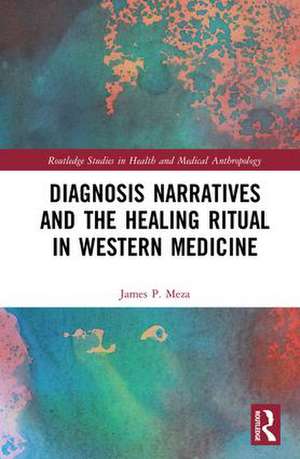Diagnosis Narratives and the Healing Ritual in Western Medicine: Routledge Studies in Health and Medical Anthropology
Autor James Mezaen Limba Engleză Hardback – 26 iul 2018
| Toate formatele și edițiile | Preț | Express |
|---|---|---|
| Paperback (1) | 255.84 lei 6-8 săpt. | |
| Taylor & Francis – 30 iun 2020 | 255.84 lei 6-8 săpt. | |
| Hardback (1) | 1002.32 lei 6-8 săpt. | |
| Taylor & Francis – 26 iul 2018 | 1002.32 lei 6-8 săpt. |
Din seria Routledge Studies in Health and Medical Anthropology
-
 Preț: 326.78 lei
Preț: 326.78 lei - 17%
 Preț: 255.84 lei
Preț: 255.84 lei - 5%
 Preț: 366.18 lei
Preț: 366.18 lei -
 Preț: 384.86 lei
Preț: 384.86 lei -
 Preț: 383.12 lei
Preț: 383.12 lei - 20%
 Preț: 259.98 lei
Preț: 259.98 lei -
 Preț: 389.38 lei
Preț: 389.38 lei -
 Preț: 385.54 lei
Preț: 385.54 lei -
 Preț: 383.17 lei
Preț: 383.17 lei -
 Preț: 364.35 lei
Preț: 364.35 lei -
 Preț: 382.57 lei
Preț: 382.57 lei -
 Preț: 384.86 lei
Preț: 384.86 lei -
 Preț: 310.09 lei
Preț: 310.09 lei -
 Preț: 391.40 lei
Preț: 391.40 lei - 18%
 Preț: 1005.17 lei
Preț: 1005.17 lei - 18%
 Preț: 1001.55 lei
Preț: 1001.55 lei - 9%
 Preț: 901.03 lei
Preț: 901.03 lei - 18%
 Preț: 1003.30 lei
Preț: 1003.30 lei
Preț: 1002.32 lei
Preț vechi: 1222.35 lei
-18% Nou
Puncte Express: 1503
Preț estimativ în valută:
191.79€ • 208.99$ • 161.61£
191.79€ • 208.99$ • 161.61£
Carte tipărită la comandă
Livrare economică 23 aprilie-07 mai
Preluare comenzi: 021 569.72.76
Specificații
ISBN-13: 9781138631427
ISBN-10: 1138631426
Pagini: 272
Ilustrații: 11 Illustrations, black and white
Dimensiuni: 156 x 234 x 20 mm
Greutate: 0.51 kg
Ediția:1
Editura: Taylor & Francis
Colecția Routledge
Seria Routledge Studies in Health and Medical Anthropology
Locul publicării:Oxford, United Kingdom
ISBN-10: 1138631426
Pagini: 272
Ilustrații: 11 Illustrations, black and white
Dimensiuni: 156 x 234 x 20 mm
Greutate: 0.51 kg
Ediția:1
Editura: Taylor & Francis
Colecția Routledge
Seria Routledge Studies in Health and Medical Anthropology
Locul publicării:Oxford, United Kingdom
Public țintă
PostgraduateCuprins
Part I: Methods
1. Fieldwork methods
2. The theoretical frame
Part II: The diagnosis narratives
3. Entrance into the field
4. Who is narrating and what story are they telling?
5. Spatial cognitions
6. The doctor tells the diagnostic story to the patient
7. Joint attention to the diagnostic narrative
8. Spatial therapy
Part III: Ritual healing in Western medicine
9. Ritual theory
10. Disease as an existential threat
11. Qualifications of a leech
12. Healing relationships
13. When the healing ritual fails
Part IV: The body politic
14. The business of medicine
15. Overdiagnosis and overtreatment
Part V: Narrative studies on healing reconsidered
16. Narrative healing reconsidered
17. Theoretical synthesis
18. Reflections of a healer
Appendix A: Individual patient narratives
Appendix B: Doctors talk about work
Appendix C: Codebook and themes
1. Fieldwork methods
2. The theoretical frame
Part II: The diagnosis narratives
3. Entrance into the field
4. Who is narrating and what story are they telling?
5. Spatial cognitions
6. The doctor tells the diagnostic story to the patient
7. Joint attention to the diagnostic narrative
8. Spatial therapy
Part III: Ritual healing in Western medicine
9. Ritual theory
10. Disease as an existential threat
11. Qualifications of a leech
12. Healing relationships
13. When the healing ritual fails
Part IV: The body politic
14. The business of medicine
15. Overdiagnosis and overtreatment
Part V: Narrative studies on healing reconsidered
16. Narrative healing reconsidered
17. Theoretical synthesis
18. Reflections of a healer
Appendix A: Individual patient narratives
Appendix B: Doctors talk about work
Appendix C: Codebook and themes
Notă biografică
James P. Meza is Assistant Professor in the Department of Family Medicine and Public Health Science at Wayne State University School of Medicine, USA. He holds a PhD in Cultural Anthropology and is a practising doctor of medicine (MD).
Descriere
The dominance of ‘illness narratives’ in narrative healing studies has tended to mean that the focus centres around the healing of the individual. Meza proposes that this emphasis is misplaced and the true focus of cultural healing should lie in managing the disruption of disease and death (cultural or biological) to the individual’s relationship with society. Using a novel combination of narrative theory and cognitive anthropology to represent the ethnographic data, Meza’s ethnography is a valuable contribution in a field where ethnographic records related to medical clinical encounters are scarce.
